With main characters who are former superheroes trying to pursue justice in the turbulent 1960s, The American Way: Those Above and Those Below is a comic book series about revolutions old and new. Fires start burning in the series’ latest issue and writer John Ridley talks to us about what it all means.
Image: Vertigo
I’ll be talking to Ridley about the events of each issue of the new American Way series, set in a world where members of a defunct US federal superhero program try to figure out how to change the world for the better. The American Way: Those Above and Those Below features art by Georges Jeanty, Danny Miki and Nick Filardi. The interview that follows discusses events in issue #2.

The Story So Far
In the last issue of The American Way: Those Above and Those Below, Jason Fisher — who still uses the jetpack he wore as government super-symbol the New American — stopped Willie Betts from stealing weapons from an armoury in Baltimore. Betts hid his lust for killing behind black nationalist rhetoric and died in a explosion during a confrontation with Jason. Meanwhile, Jason’s former teammate Amber is part of a underground radical movement in Oakland, using her explosive powers to cause detonations in government buildings. Missy, another member of the Civil Defence Corps team, gets petitioned to run for public office by a Mississippi political operative but turns him down.
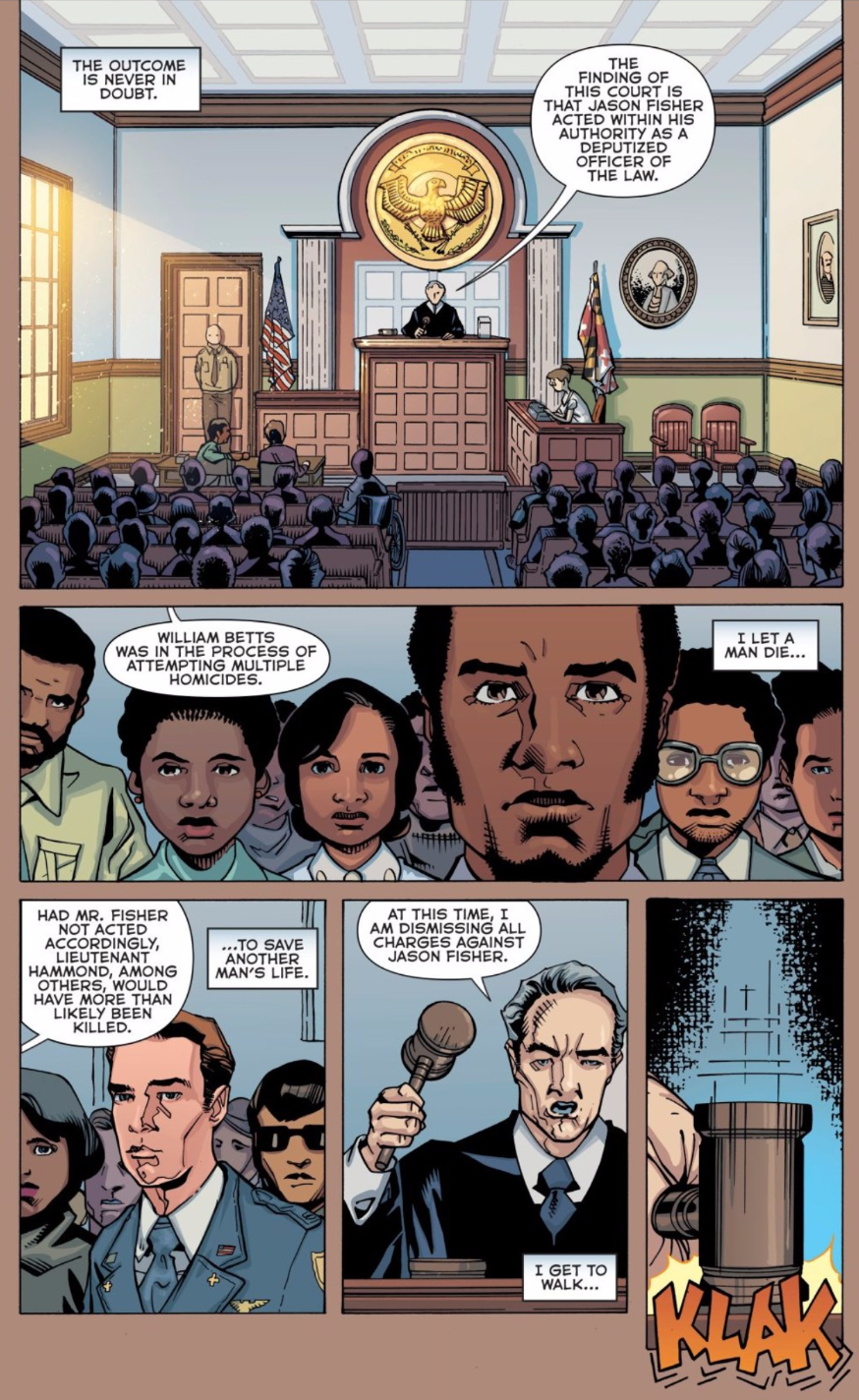
The issue opens with a really powerful scene, where you’re putting Jason in court for what is essentially a wrongful death case. On one hand, the killing is justifiable — at least in his view — but it’s also reprehensible to the masses of people outside the courthouse. Why put Jason in the same spot where we see a lot of white police officers of late, in the real world?
John Ridley: Part of it is what’s going on now, the courts and the system and people of colour feeling as though there’s no recourse within the courts themselves. Comic book stories, they end with the hero doing whatever they do. And you don’t even see the judiciary involved. At some point, there has to be some kind of review of what they did or what happened. There must be some kind of oversight.
So the idea [is] that throughout that first issue, Jason is building toward something. Evan, his brother, is literally telling him, “You’ve got to be careful. Whatever you do, you’ve got to be able to live with that choice.” He makes a choice. He knows he’s going to have to live with that choice. And coming out of it, he knows that the court — there’s no way he’s going to be convicted — it’s only going to make it worse. The idea that going through a process — having a process — is exactly where the discord reaches a point where people feel like, “That’s the straw that breaks the camel’s back.” And he’s sitting there in court going, “The outcome is never in doubt.”

Once we learn a little more about this soldier [whose life he saved], it’s apparent this guy is the most reprehensible kind of person that you can imagine. Him using the N-word, you get a pretty good idea. In that moment, Jason didn’t know how bad this guy was. The circumstance is one guy wilfully trying to take a life, and another dude who’s maybe the worst person on the planet trying to stop him. So, Jason makes this choice, operating outside the law. The people in the community see that choice being validated in the courts — and yes, we see that in Ferguson, Baltimore, and so many places — where people say to the community, “You know, it was horrible, but let the courts decide.” “That’s what the courts are for.” But, yeah, how many times do you see it where the decisions made in the courtroom oftentimes do not match what we see, in terms of evidence and what we believe? I think it was [author James] Baldwin who talked about the evidence of things unseen. You know? The things that are felt.
And the courts can’t account for that. Based on what you’re saying, historical allusions were definitely intentional when you were writing that scene.
Ridley: Yeah, absolutely. And I sincerely do want to split the difference: We don’t often see that bridge between what somebody did and some institution saying, “Yes, what you did was in the letter of the law — you’re a duly deputised person — so it’s OK.” Compounding that, the history of the real world, when that [kind of incident] happens with a person of colour, you are a representation of the system. You are no longer therefore us, you are completely of the system. And that obviously has reverberations throughout this episode and the series, where people are like, “OK — the courts will not hear us, but we will be heard in whatever manner we choose.”
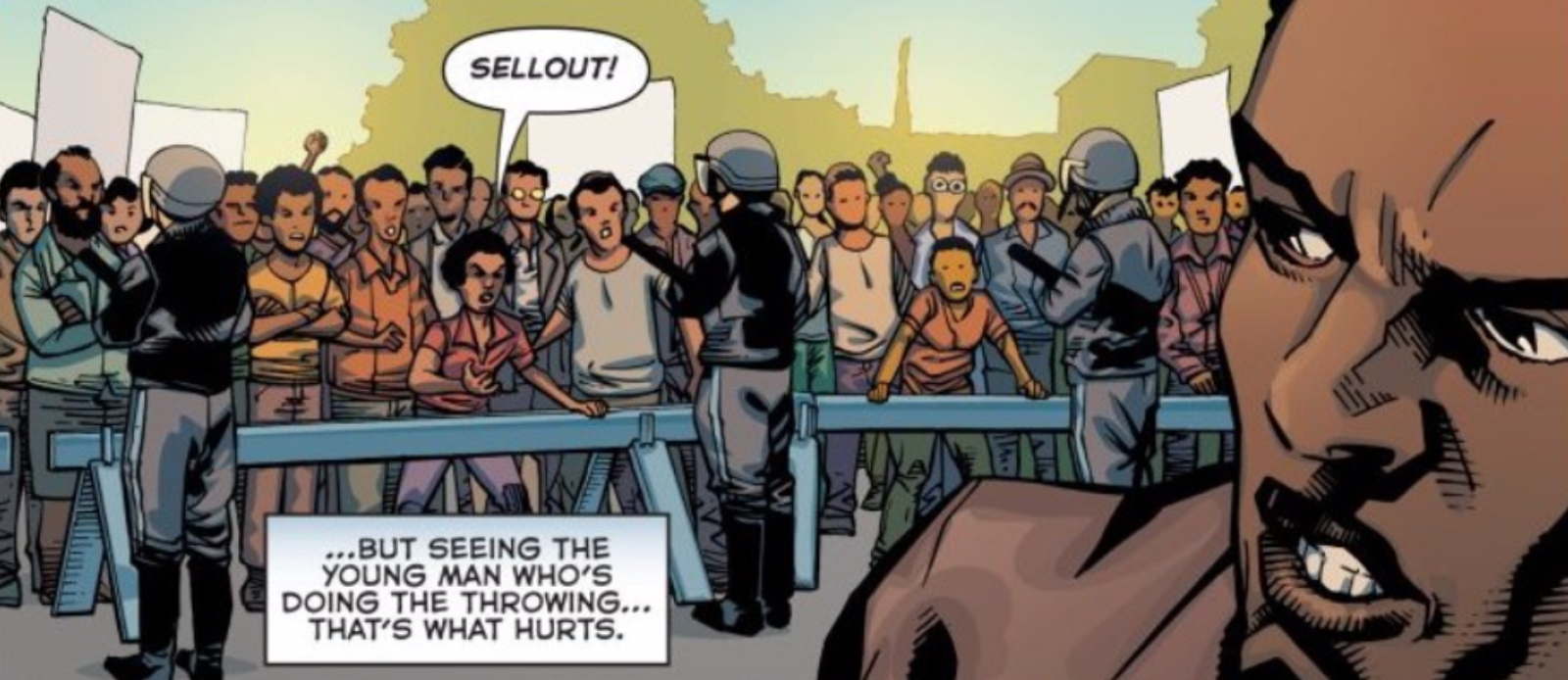
“Sellout” is such a charged term. How much did you think about using it? To me, it would hurt me more to get called a sellout by another black person than it would be to get called the N-word by a white person…
Ridley: I agree with that.
…especially for someone in Jason’s position where he’s trying to be a hero as in as best a way as he can, and for that to get hurled at him probably has to hurt.
Ridley: Yeah, I do think that’s a fair point. I agree a thousand per cent. For the majority of people of colour, if some time in your life you’ve been hit with an insult from some other group, that’s one thing. But when you get hit by your own group — especially when you strive to do certain things, like the integration that we’re supposed to be striving for — and other people go, “100 per cent, you’re a sellout!” That is painful.
It is unpleasant when you get it from white folks. You know, some straight white male in power. I’ll just say from my own experience, it’s a whole different kind of pain. You go, “Wow, you’re really misinterpreting things that I’m trying to do.” And it’s certainly more painful when it comes from folks that you’re hoping to inspire or encourage or create pathways for, in areas where other people have already shut down. That’s certainly what I want to express, and I think Jason is aware of it when it’s this kid who’s yelling at him and it’s like, “They have found a way to hurt me that is completely different than white racists could ever do…”
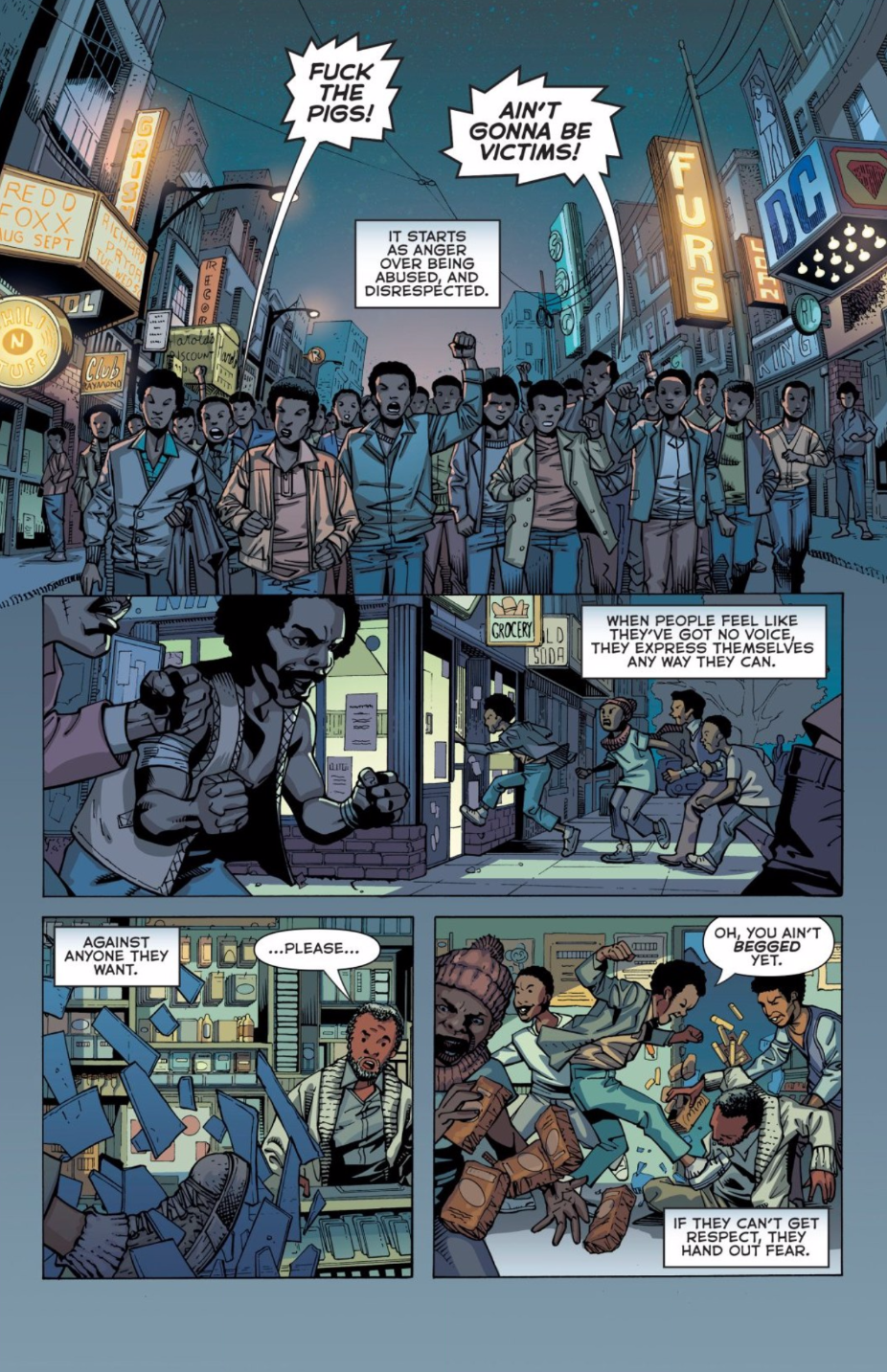
When I was writing these questions, the first thing I began to type for this scene was the word “riot”. But then I told myself, “No, you know better.” This is frustration. This is an eruption. This is rebellion. It’s not a riot. I’m a strong believer in intention, and I think when that word is used to describe these protests historically, it’s used in a negative connotation.
Ridley: I was watching the news [about Charlottesville] this weekend, and, only once did I hear literally one person use the word “riot”. And that to me was stunning. I never want to get into a battle of semantics with people but why did we only hear that word once? It’s a bunch of white supremacists, neo-Nazis… you know, clearly agitating and without real grievance. These are people, in my opinion, without any real particular grievance.
But, yes, in our comic book world, it gets to the point where they’re outraged and distressed. The verdict that Jason receives is certainly going to play a particular way and that’s the pushback. It will come into play. Language is charged, and I don’t think as a writer I want to shy away from it. I know people are going to come with their agendas to say what’s inappropriate, but, if we’re mirroring the real world, I don’t know how you can delve into the events that we’re delving into and not use potent symbols, potent imagery in service of those thoughts, those beliefs. Judgments are often times applied with an agenda in place, or there are individuals in the prevailing culture who get to use them. Or get to use certain symbols, and get a pass.
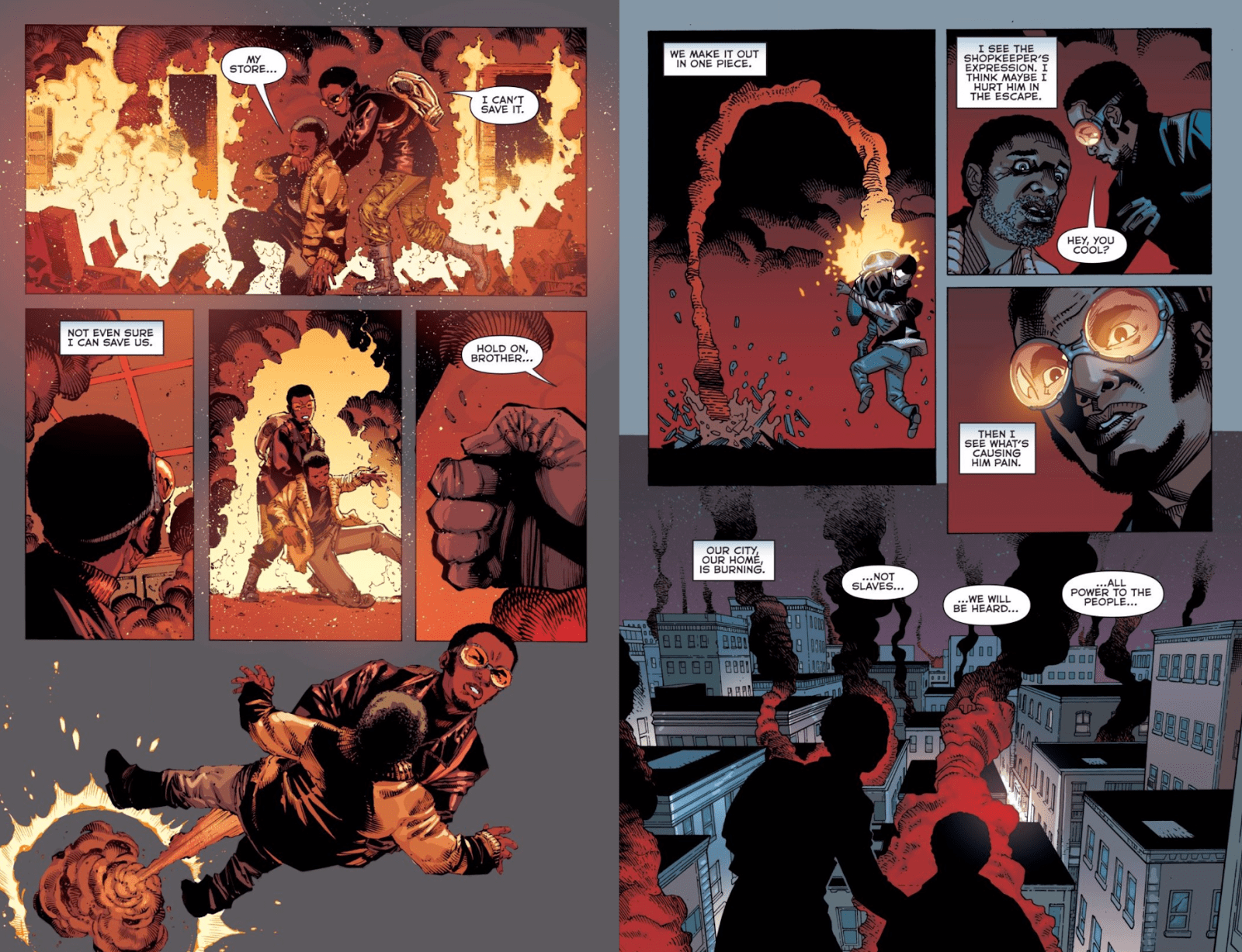
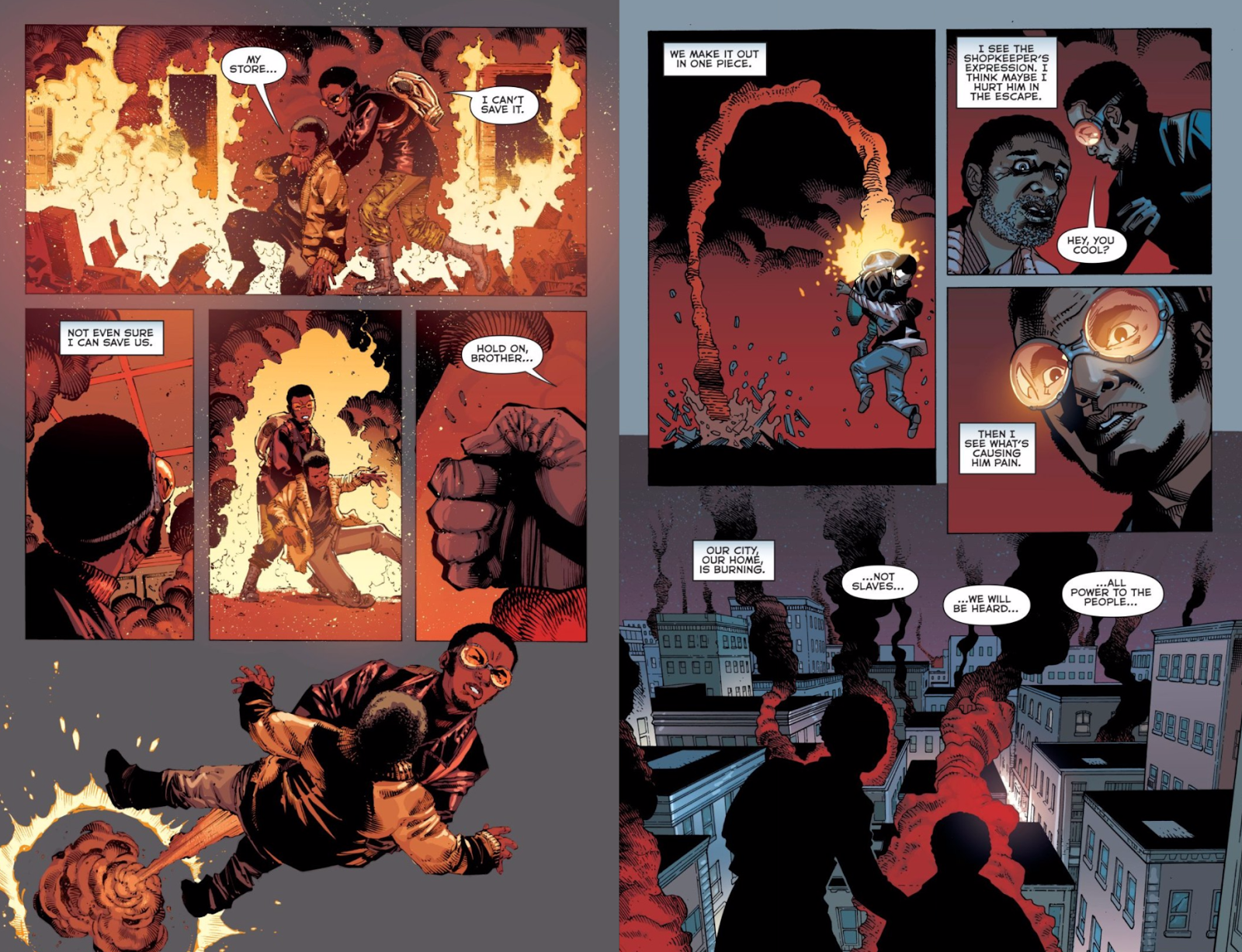
That scene with the unrest is obviously a consequence of the other one at the courthouse. But again, this weekend has been a perfect example of how people will take the logic of something horrible and use it to promote anti-black racism. How did you set up the scene while trying to avoid that pitfall?
Ridley: Well, one thing I wanted to make sure we did with our three principals was show how their good intentions lead to violent consequences. You have Jason’s actions in last issue and Amber, this issue, she accidentally kills a police officer. And you have Missy. She certainly believes her intentions are good. In trying to say, “There is honour in our heritage,” that is going to — not too much of a spoiler — it’s going to lead to bad consequences.
So it’s something for all these individuals to deal with. We saw it this weekend. What happened this weekend didn’t come from nowhere. I’m over-explaining, but [it comes from] people giving a soft pass, or a wink-and-a-nod, or quite literally inviting people to the Oval Office who not only agree with but fully support the ideas of white supremacy.
I also wanted to touch on another side of what Dr King and other people who stood up for peace and justice had to deal with. They were putting together marches and activism that was built around passive non-violent resistance. But people show up and they want to do damage and hurt people. Not everyone can embody those ideals all the time, especially in the face of violent attacks.
With all of the characters, they are all looking at the fact that what they’re trying to accomplish is not as easy in the real world. They can’t really accomplish the idealism and there are unintended consequences to their actions. So, to answer your question, people are going to come with their agendas in place, no matter what. But at this point, I hope and think anybody picking up The American Way have the capacity to see the larger ramifications and not just ignore the context of a scene where people of colour spill out on the streets in anger and frustration.
What we’re dealing with is a black man who is trying to be a community hero. A white girl who is trying to be a radical. And an older white woman who is trying to be a politician. And all three of them fail at it, and all three of their actions incite violence from followers or fellow travellers. You know, this is not just, “This is what black people do and that’s all that’s going to happen.” Or, “This is what white radicals are going to do and that’s all that’s going to happen.” Or, “This is all that Southern leaders are and every one of them is an intentional bigot,” as opposed to blind to the invitations of bigotry. The challenge here — for me and the reader — is not drifting into tropes, stereotypes, or things that have been so warmed over to the point they’re no longer digestible. Hopefully, I’m building a narrative that is more reflective of the real world, by bringing in personalised perspective, as opposed to one idea in a very narrow focus. It doesn’t always work out the way that you want it to.
What are the tensions that Jason’s struggling with as a result of his decision to enforce his own kind of racially neutral justice? How does his past as a member of the CDC weigh on his feelings about vigilantism now that he’s gone independent? He was vetted by the government…
Ridley: In the last American Way series, Jason was the embodiment of a empowered black man, literally and figuratively. Now, he’s gone against the system and carved his own path. There’s a line in there where he dismisses both conservatism and liberalism, and says, “We’re going to do it our way,” and we see him flying off into the sunset as a hero should. But what’s interesting to me, is the idea that movements get eclipsed by realities. In a very particular way, Jason is franchised by the government. He remains a person who wants to do the best he can for his community, but if you’re trying to create the world in your own image, you’re just a form of the establishment. You’re not any better than that.
So, his past weighs on him, and the ghost of the past becomes — as the series goes on — a real lever for other individuals to use to get him to alter his trajectory for their concerns. People try to get Jason to make amends for things that have gone wrong. Part of what’s going on with the series title, Those Above and Those Below, is that we’re looking at those who feel that they are above the law. And those who operate outside the law, below the surface in an underground fashion. And, as this story continues to progress, I want to make people think about vigilantism, working outside the law, and who has the right to use their powers and abilities and what for and under what circumstances. How does that change when we agree or disagree with what they do? If I know your history and backstory, how does that change how you feel about the things that I do? What I try to accomplish? And that becomes a very big part of the story moving forward.
One of the things I’m enjoying about the book is that if feels kind of grindhouse-y and slightly overheated. Is that a conscious, tonal decision on your part?
Ridley: Oh yeah. When I sat down with [editor] Jamie Rich, one of the things I said was that this is not going to be a big “people using a lot of powers” series. So it’s a little pulpy in spaces because it is a departure from your typical hero books and we’re playing with extremities. Amber, at this point, has used her power to basically make these fusion energy globes as bombs. Missy has not used them at all. Jason has used them very sparingly. So how do we make these people feel a little extraordinary, extreme? Willie Best, from issue #1, was this very hardcore urban guerrilla facing off against a guy who, when you aim a shotgun blast to the side of his face, it’d be like hitting him with a baseball bat, but that’s about it. And Amber, this petite, blonde-haired, blue-eyed strung out junkie girl who’s going around trying to blow stuff up. You’ve got Missy, who’s based on Lurleen Wallace, George Wallace’s wife. She got cancer and that fact was hidden from the news media. With Missy, she knows she’s going to die and that just changes your mind. She feels like where we were is better than where we’re going. And this is going to be my legacy. You can’t talk somebody out of that. It’s very hard to talk them out of it. And that certainly becomes a very, very indelible plot point as we move forward.
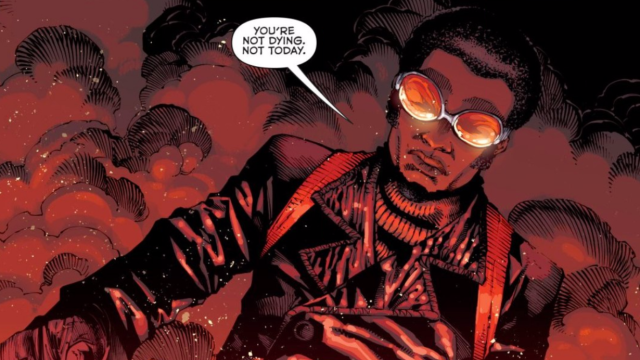
Comments